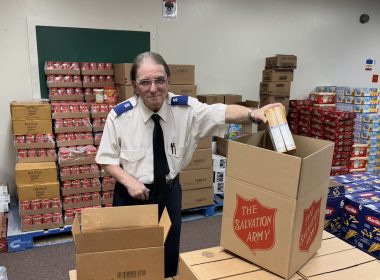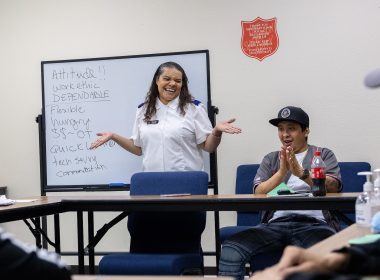BODY BUILDER
by Terry Camsey, Major –
I have had Russell on my mind a great deal lately. Russell was (as we used to say) an incredible “trophy of grace.” To see evidence of the miracle of his conversion and relief from addiction was an inspiration.
Russell was a born preacher and I told him so frequently. Somehow, each testimony he gave turned into a powerful message. He’d start facing the platform, then gradually turn around as the Spirit took control and face the people, becoming more and more animated as he spoke.
As the day approached for him to “return” to society though, I sensed his fear of leaving the safe surroundings of a congregation…no, more than a congregation, a “family” which offered support, sustenance and safety. Those of us who have never faced satanic attacks of the evil one—attacks, which tightly target those with addictive weaknesses—cannot know such fear. Russell was, doubtless, a prime target. We saw him for a few weeks and all seemed to be well then, suddenly, he was absent. He had disappeared. Efforts to trace him have been unsuccessful and it hurts.
Every week I look for him in vain as I turn towards his usual seat near the front and center. Such a gift…such a miracle…such an attack…
Could I have done more? The thought is constantly with me. Did we (did I) fail him somehow during that difficult time of re-entry into society?
What is immediately apparent is the value of a supportive congregation for every member of our many congregations. I used to frequently ask members of congregations whether they belonged to a loving congregation, and whether they themselves felt loved. I would divide the responses into two piles…those who had been at a corps three years or more…and those who had been at the corps for less time than that. I would also ask them whether they felt they were in the “inner circle” or on “the fringe” of the congregation. Invariably, those at the corps three years or more considered the congregation to be loving, to be themselves loved, and to consider themselves part of the inner circle.
Those at the corps for less than three years generally felt that the congregation was unloving, that they themselves were not loved, and that they were on the outer fringe.
If people do not feel loved, is the congregation a loving one…despite its belief that it is?
A few years ago, the Arns (Win and Charles) developed a “Love Quotient” scale for measuring (what else?) the “lovingness” of a congregation. It was a valuable tool since it is so easy for congregations not to notice when a member is absent for more than a week or so. If no one notices, or worse, if such absentees are not contacted, it is so easy to assume no one cares and to drop out permanently. That is why it is so helpful to have a comprehensive, all-inclusive, lay shepherding system in place…even churches as large as Crystal Cathedral have such a system in place, each ten or so families being cared for by under-shepherds who—in turn—are shepherded by over-shepherds. The concept is so simple to implement, costs virtually nothing, and offers ministry opportunities to members of the congregation. It also builds the relational DNA that enables churches/corps to grow indefinitely, while maintaining a personal touch with each member.
Some years ago I visited Los Angeles Central Corps, a Latino congregation. In the back row was an elderly Caucasian lady in uniform who obviously did not understand the Spanish language yet, nevertheless, was enjoying herself. I asked the (then) officer where she had come from. He told me that, during regular Tuesday evening door-to-door visitation, she had answered the door and said, “At last…you’ve come.” He asked her what she meant and she told how, more than 20 years earlier, she had regularly attended a Caucasian corps. She became sick and was hospitalized; yet no one from that corps had ever visited over the whole of that period, until this “accidental” encounter by Salvationists of a different ethnicity!
I wonder how many others have been lost to the Army simply because no one noticed their absence. Even if there were only one, and that loss could have been avoided by the effective follow-up of a lay shepherding team, it is one too many.
“O love that wilt not let me go…”?







